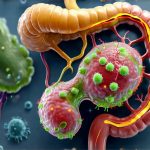The human body is not simply a collection of its own cells; it’s an ecosystem teeming with trillions of microorganisms – bacteria, fungi, viruses, and other microbes. These microscopic inhabitants reside primarily in our digestive tract, forming what’s known as the gut microbiota (or microbiome). For years, these communities were largely overlooked, but recent advancements in scientific understanding have revealed their profound impact on nearly every aspect of human health, from digestion and immunity to mental wellbeing and even chronic disease risk. Understanding this intricate relationship is key to appreciating the complexity of our own bodies and exploring possibilities for improved wellness.
The sheer number of microbial cells within us outnumbers our own human cells by a significant margin. This isn’t an invasion; it’s symbiosis – a mutually beneficial relationship where both we and these microbes thrive. The gut microbiota aids in processes our bodies can’t do alone, while receiving a stable environment and nourishment in return. This intricate interplay is constantly evolving based on factors like diet, lifestyle, genetics, and environmental exposures, making each person’s microbiome unique.
What is the Gut Microbiota?
The term “gut microbiota” refers to the diverse community of microorganisms residing in our digestive tract. It’s not a static entity; its composition changes throughout life based on various influences. This dynamic ecosystem isn’t limited to the intestines either, extending from the mouth to the colon and encompassing a vast array of microbial species.
The majority of gut microbes are bacteria, but other microorganisms play important roles too. A healthy gut microbiota is characterized by diversity – a wide range of different species coexisting harmoniously. This diversity is often linked to better health outcomes, suggesting that a more robust and balanced microbiome can provide greater resilience and functional capacity.
The Roles of Gut Microbiota in Health
Digestion and Nutrient Absorption
One of the most well-established roles of the gut microbiota is its involvement in digestion. Certain bacteria help break down complex carbohydrates like fiber that our bodies cannot digest on their own, releasing valuable nutrients in the process. This fermentation process also produces short-chain fatty acids (SCFAs), such as butyrate, propionate, and acetate. These SCFAs aren’t just waste products; they serve as an important energy source for cells in the gut lining and have systemic effects throughout the body.
Furthermore, the microbiota aids in the absorption of essential vitamins and minerals. For example, some bacteria synthesize vitamin K and certain B vitamins, making them available for our bodies to use. A disrupted microbiome can impair nutrient absorption, potentially leading to deficiencies even with a seemingly balanced diet.
Immune System Modulation
The gut is a crucial site for immune system development and function, and the microbiota plays a central role in shaping it. Early exposure to diverse microbes helps “train” the immune system to distinguish between harmless substances and potential threats. The microbiota stimulates the production of antibodies and regulates immune cell activity, contributing to both local intestinal immunity and systemic immune responses.
A healthy gut microbiome acts as a barrier against pathogenic (harmful) bacteria. Beneficial microbes compete with pathogens for resources and produce antimicrobial compounds that inhibit their growth. This competition helps prevent infections and maintain overall gut health. Imbalances in the microbiota can weaken this defense, increasing susceptibility to illness.
Gut-Brain Axis Communication
Emerging research highlights a fascinating connection between the gut and the brain – known as the gut-brain axis. This bidirectional communication pathway involves neural, hormonal, and immunological signaling. The gut microbiota influences brain function through several mechanisms, including the production of neurotransmitters like serotonin and dopamine (which play roles in mood regulation) and modulation of the vagus nerve—a major conduit between the gut and the brain.
Alterations in the gut microbiome have been linked to changes in mood, behavior, and cognitive function. While the exact mechanisms are still being investigated, there’s growing evidence that a healthy gut microbiota can contribute to improved mental wellbeing. Conversely, imbalances may be associated with increased risk of anxiety, depression, and other neurological conditions.
The study of the gut microbiota is a rapidly evolving field. As research progresses, we’re uncovering even more intricate details about its influence on human health. While maintaining a diverse and balanced microbiome isn’t a guarantee against illness or a substitute for healthy lifestyle choices, it’s increasingly recognized as an essential component of overall wellness. Supporting your gut microbiota through dietary adjustments – focusing on fiber-rich foods, fermented products, and minimizing processed foods – alongside stress management and appropriate physical activity can contribute to a healthier, more resilient you. Further exploration of this complex ecosystem promises exciting opportunities for preventative healthcare and personalized medicine in the future.


















